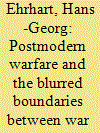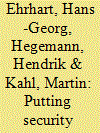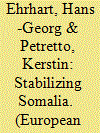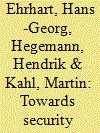|
|
|
Sort Order |
|
|
|
Items / Page
|
|
|
|
|
|
|
| Srl | Item |
| 1 |
ID:
074348


|
|
|
| 2 |
ID:
154706


|
|
|
|
|
| Summary/Abstract |
Each age has its own wars and its own forms of warfare. In today’s evolving world risk society warfare has entered a new development stage. The states of the “global North” adapt their forms of intervention. They increasingly practice postmodern warfare characterized especially by the role of influencing the information space, networked approaches, the incorporation of indirect and covert actions, and the special quality of new technologies. This practice furthers an increasing grey zone between limiting and de-bounding of warfare. The phenomenon of postmodern warfare raises some tough questions and offers a rich research agenda.
|
|
|
|
|
|
|
|
|
|
|
|
|
|
|
|
| 3 |
ID:
128239


|
|
|
|
|
| Publication |
2014.
|
| Summary/Abstract |
Security governance has featured prominently in recent debates about fragmentation, informalization, and privatization in the increasingly diverse field of security policy. It has inspired much valuable research. Yet, there are not just very different conceptual understandings of security governance; there is also a lack of clarity regarding its empirical manifestations and normative connotations. After a decade of research, the special issue therefore puts security governance to the test and scrutinizes its analytical and political pitfalls and potentials. This editorial briefly reviews the rise of security governance, identifies central conceptual, empirical, and normative challenges that need to be addressed, and introduces the individual contributions to this special issue.
|
|
|
|
|
|
|
|
|
|
|
|
|
|
|
|
| 4 |
ID:
128236


|
|
|
|
|
| Publication |
2014.
|
| Summary/Abstract |
States with limited statehood such as Somalia can cause transnational security challenges. The emergence of an insurgent group with links to Al Qaida and piracy emanating from its coast are cases in point. In this article, we tackle the question of whether the EU's comprehensive approach toward Somalia is working. To do this, we analyze its effectiveness, its legitimacy, and the influence of power by appraising three characteristics of the security governance concept in a critical manner. We conclude that the result is mixed. Even if the EU's comprehensive approach were perfect in a technical sense, it would still face restraints, because any solution has to come from Somali themselves. Not only should they be an integral part of it, they should become the real owners of the state-building process in the first place.
|
|
|
|
|
|
|
|
|
|
|
|
|
|
|
|
| 5 |
ID:
128234


|
|
|
|
|
| Publication |
2014.
|
| Summary/Abstract |
This article argues that security governance can and should be reframed as a critical tool that enables us to understand and reappraise concrete practices of security provision. Security governance needs to move beyond the functional mapping of different governing arrangements and the presumption that security governance leads to effective and legitimate problem-solving in a quasi-automatic manner. In this article, we propose a framework that identifies the essential characteristics of security governance and turns them into critical questions with the aim to reveal persisting frictions and dilemmas. First, we trace the rise of security governance as concept and practice over the past decade and identify its central characteristics with regard to prerequisites, structures and consequences. Second, we reframe the core characteristics of security governance into critical questions and thereby develop an understanding of security governance as a critical tool. Finally, we illustrate the relevance of this approach with examples from EU security governance.
|
|
|
|
|
|
|
|
|
|
|
|
|
|
|
|
|
|
|
|
|